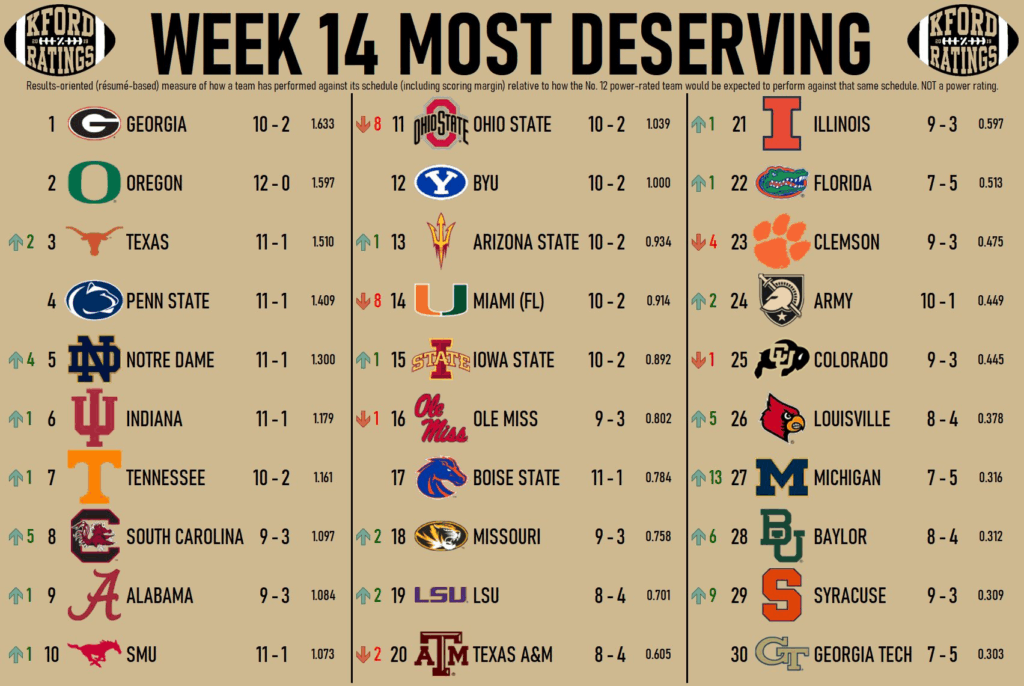Deciphering the new CFP strength of schedule criteria
No matter your take on how many teams should be included in the College Football Playoff (it better not be 28), we can all agree that one of the most insufferable portions of last year’s season was the discourse around the final two spots in the final rankings.
Five auto-bids and five teams between the Big Ten, SEC, and Notre Dame were locks. The final two spots were between 11-1 Indiana, 11-2 SMU, fresh off an ACC championship loss, and nine-win SEC teams like Alabama, Ole Miss, and South Carolina.
We all remember the outcry from Crimson Tide faithful after their omission in favor of teams whose best wins were against Louisville and a QB-less Michigan, non-top-25 teams in the final ranking. No matter what side you were on, it was clear that the process and criteria seemed finicky. For one ranking, this mattered; for a different one, a new criterion was the decider. What actually mattered to the committee?
In response to this, the committee is making efforts to centralize the decision-making process. The 13-member group announced that its criteria would be changing, with the following statement attached:
“Changes for the upcoming season include enhancements to the tools that the selection committee uses to assess schedule strength and how teams perform against their schedule. The current schedule strength metric has been adjusted to apply greater weight to games against strong opponents,” the College Football Playoff release stated. “An additional metric, record strength, has been added to the selection committee’s analysis to go beyond a team’s schedule strength to assess how a team performed against that schedule. This metric rewards teams defeating high-quality opponents while minimizing the penalty for losing to such a team. Conversely, these changes will provide minimal reward for defeating a lower-quality opponent while imposing a greater penalty for losing to such a team.”
But what does this all mean?
Well, it’s a lot of nothingness that mostly ties down to one central idea:
Win vs. CFP-level team = Great
Lose vs. CFP-level team = Acceptable
Win vs. a mediocre or bad team = You did your job
Lose vs. a mediocre or bad team = Big punishment
Wait, wait, wait.
We weren’t already doing that?
The problem with what the committee has released is that’s what we were expecting them to do from the start. If Texas loses to Ohio State in Week One, that shouldn’t negatively affect them the same way it positively affects Ohio State. It’s not a zero-sum matchup.
The article outlines a few other procedural changes to their recusal policy that don’t really impact what we will see from our point of view. It’s a bit of a nothing-burger disguised in a well-manicured press release.
Here’s a part I did like, though.
“We feel these changes will help construct a postseason bracket that recognizes the best performances and teams on the field during the regular season, and I want to thank our veteran selection committee members and data analytics groups for helping implement these changes.”
The wording ‘best performances’ is important here. I really don’t want the playoff to be the best teams getting the last spot. We all know Alabama was a better TEAM than SMU last year. But the performances are what actually matter. Lose to Vanderbilt as one of your three L’s? You probably shouldn’t be in.
Top 10
- 1New
Frank Wilson
Interim HC hired by LSU rival
- 2
ACC Schedule
New format revealed
- 3Hot
Jeremiyah Love
Makes NFL Draft decision
- 4
Jadan Baugh
Intel on Florida RB
- 5Trending
Alabama vs. Oklahoma
Key injury statuses revealed
Get the Daily On3 Newsletter in your inbox every morning
By clicking "Subscribe to Newsletter", I agree to On3's Privacy Notice, Terms, and use of my personal information described therein.
I also like how much it seems like they are talking to people with data backgrounds. In a perfect world, we don’t need to make decisions here. A model could do the CFP committee’s job for it. Judge every team based on how the 12th-best team in the nation is expected to finish with their schedule, and diagnose how well they’ve done based on that.
Here’s an example of this:

This is from Kelley Ford, a power-rating specialist on X. I’m a big fan. He has his own model that is résumé-based and factors in what the average team making the CFP should have done with the schedule. Now, this is not perfect. No reason Oregon shouldn’t have been the No. 1 seed last year, but it does have some intriguing points that we hadn’t discussed much last year.
Did Ohio State even fully deserve to be in the playoff in the first place? Why didn’t BYU have a better ranking given their wins against SMU and K-State?
Again, not perfect, but something to keep an eye on.
The playoff just needs to be consistent, and it needs to reward teams correctly. If you make the conference championship game, you should not be able to fall in rankings, no matter how much you lose by. You can only be rewarded, not punished.
Losses should be expected in this era, and teams shouldn’t be heavily penalized for losing against CFP-level opponents on their schedule, even if they end up being “upsets.” KFord really liked Georgia last year because they won four out of these six insanely hard games: N vs. Clemson, @ Alabama, @ Texas, @ Ole Miss, vs. Tennessee, and N vs. Texas in the SECCG. Doing that and winning every other game feels almost impossible in this day and age, yet they did it.
The jobs of these people aren’t as simple as lounging in a luxury conference room and watching college football, but it really isn’t all that difficult. Set a criterion (which it seems they’ve done better this year), assess all teams fairly on that criterion, and consistently set that precedent from your first ranking to your last. No matter what, a team is going to feel snubbed if they’re No. 13 on the ranking, but we can’t as a whole be enraged with the results if the process stays consistent.
























